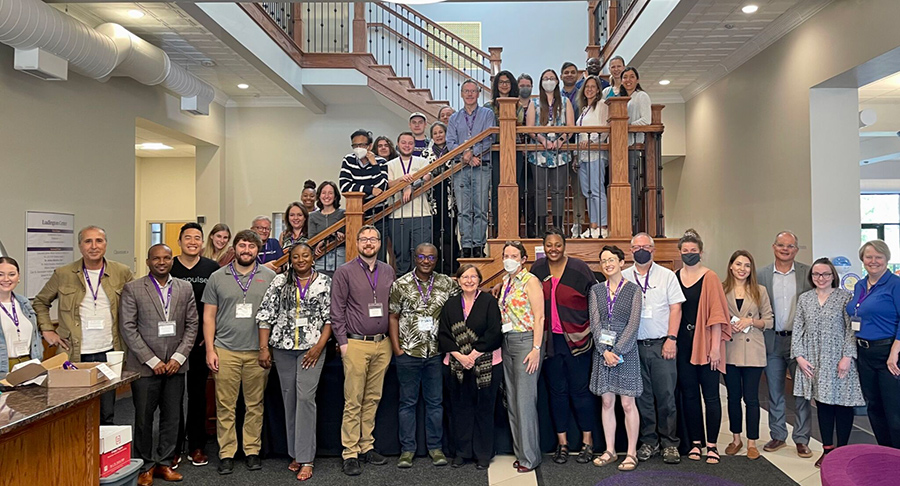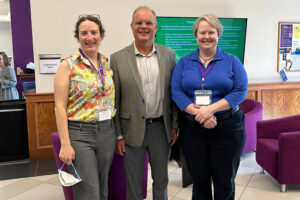Albion Welcomes International Educators in Sustainable Communities Conference
Related Programs
Related Posts
Connect With Us
‘We do not need to do this work alone.’ Discussion and ideas flow around colleges’ potential for local and global impact.
June 10, 2022

A group of attendees gathered for a photo at the Ludington Center stairs during their three-day conference exploring “The Role of Higher Education in Nurturing Sustainable Communities.”
By Jake Weber
Every college has a unique relationship with the local community, and a conference hosted by Albion College this week demonstrated that “local focus” is indeed an international topic. Nearly 70 educators from eight countries gathered in Albion June 6-8 to discuss ”The Role of Higher Education in Nurturing Sustainable Communities.”
“Colleges and universities play an important role in both developing the leaders of tomorrow and contributing positively to the communities of which they are a part,” said Cristen Casey, director of Albion College’s Center for International Education. “During this conference, we discussed the many ways that colleges collaborate within their local, national and global communities on projects sustainably, respectfully and ethically.”
In addition to members of the Albion community, conference participants came from 16 schools in Africa, Asia, Europe, South America and the U.S. Many of the institutions are part of the Global Liberal Arts Alliance (GLAA), which is devoted to encouraging international partnerships between its members. While the GLAA may seem like an odd place to work on local issues, Casey explains that’s absolutely not the case.
“Community engagement and local-to-global partnerships are relevant for those who are committed to education, sustainability, social justice and responsible engagement in a world of increasingly interdependent relationships,” she said. “Global community partnerships expand options for students to have meaningful international experiences that broaden one’s sense of place and self-empowerment. Pairing these concepts makes sustainable community engagement a topic of interest to many partners.”
Dr. Nicole Webster, a professor in Pennsylvania State University’s College of Agricultural Sciences and director of its Youth Civic Lab, shared historical context on American college-community relationships along with the qualities of successful 21st-century partnerships. A researcher who has built university-community partnerships in Kosovo, Burkina Faso, Nicaragua and the U.S., Webster understands the resources universities possess — and also knows what happens when they aren’t aligned with a community’s strengths and resources.
An “asset-based perspective,” said Webster, not only builds community pride and brings leaders into the project, it also helps the college or university partner discover what the community really needs, and how it can most effectively and successfully assist in real change. An asset-based perspective “is highly preferable to addressing the perceived notions of problems,” Webster said in her opening keynote address.

Amid conference conversations, a quick photo: Albion biology professor Abigail Cahill (left); keynote speaker Diego Quiroga of the Universidad San Francisco de Quito; and Cristen Casey, director of Albion’s Center for International Education.
More than 800 miles from Ecuador’s mainland, the Galapagos Islands are a unique biosphere — and a unique environment for developing some remarkable university-community programs, said Dr. Diego Quiroga in his conference-closing keynote. Rector of the Universidad San Francisco de Quito (USFQ), Quiroga shared some of his institution’s outreach programs involving girls interested in science, female entrepreneurs and subsistence fisherman among the Islands’ 30,000 residents. He also explained that a university-community focus on education will help ensure a better future for the Islands’ unique biodiversity and its human population, along with benefiting USFQ.
“Science itself is an industry. You not only need someone to do the science, you need someone to take them in the boat,” said Quiroga, who received his Ph.D. in anthropology from the University of Illinois at Urbana-Champaign. “You need all the infrastructure, people who can handle things in the lab. [Educating the entire workforce], that’s something we’re also trying to do.”
Dr. Abigail Cahill, assistant professor of biology at Albion and conference co-organizer, took stock of the three-day event as it drew to a close. “For me, the most exciting part of the conference was seeing the participants talking and making connections around their work while here at Albion,” she said. “Our session this morning included a discussion of what continued work might come out of the conference, and I hope that some of these connections will turn into long-term relationships between campuses.”
“We all walked away with fresh ideas, strengthened relationships and new energy to continue the valuable work of sustainable community engagement,” Casey concluded. “‘We do not need to do this work alone’ was a common theme. I am excited to see how this conference’s work carries on globally into the future.”
